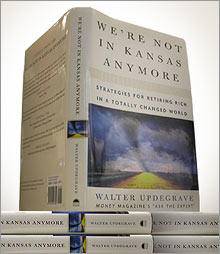|
|
|
|
|
|

|
|
More information on Updegrave's new book.
|
|
|
|
|
NEW YORK (CNNMoney.com) -
I have eight mutual funds in my 401(k) that include large-cap stocks, small-caps and international shares. I've done fairly well compared the S&P 500, but I'm not sure if I'm taking on extra risk for the extra performance. How do I know?
�B.M., San Diego, Calif.
There are a few issues I want to address, but first we can talk risk.
There's a nifty site known as RiskGrades that gives a risk score for virtually any security based on the investment's volatility versus a basket of global stocks. Now, that service alone is useful in that you can gauge the riskiness of virtually any single investment versus another -- comparing an S&P 500 index fund, say, with a hot emerging markets stock fund.
But wait (as they say in those late-night infomercials), there's more!
What makes this site really useful, in my opinion, is that it also gives a risk grade for an entire portfolio. You plug in the holdings of your investment account and get an overall grade.
It doesn't just average the riskiness of individual securities. Rather, the grade takes into account how your various securities zig and zag in relation to each other, letting you see the benefit of diversification.
You can also do lots of "what if" scenarios to see how the risk level of your 401(k) might change if you replace one security with another.
Finally, there's also a 401(k) CheckUp area on the site that can show you how your portfolio ranks on a scale from conservative to speculative.
I think this is pretty cool, especially since you don't have to shell out a cent to do this.
More important issues
But while it may be useful to see how your 401(k) compares in riskiness to the S&P 500 or where it ranks on the scale from conservative to speculative, I don't think this is the most important thing you need to know.
Far more essential is finding out whether you're on track to achieving a secure retirement. Which means you want to know whether the portfolio you accumulate by the time you retire, plus Social Security and any pensions you may receive, will be sufficient to support you comfortably for the rest of your life.
After all, what does it matter if you're taking more or less risk than the S&P 500 if you're not on track to accumulate a nest egg that's large enough to provide a decent lifestyle during a retirement than may last 30 years or longer?
As you might expect, this question -- Am I on track? -- is a more complicated one to answer because it involves a lot of assumptions and projections over a long period.
But you can get a sense of whether you're heading in the right direction and whether you need to save more or invest differently or both by checking out a few of the better retirement calculators available on the Web, such as the Retirement Planner tool at CNNMoney.com or the one at Financial Engines, which charges a fee. Many 401(k) plans also make such tools available to participants at little or no cost, and a number of investment firms provide similar calculators for their customers.
Basically, these calculators ask you to make some sort of estimate of how much income you'll need in retirement and then deduct Social Security and pensions from that estimate to see how much income you will need from your investments. Based on that figure, they estimate the size of the retirement nest egg you will need.
From there it's a simple matter -- well, maybe simple isn't the right word -- of projecting at whether you'll reach that figure based on how much you've already tucked away in retirement accounts, how much additional saving you intend to do during your career and how you invest your money.
These calculators typically use Monte Carlo assumptions in which they run thousands of simulations based on different economic and market scenarios. The idea isn't to give you a Yea or Nay, but to give you a sense of your odds of reaching your goal.
The beauty of this approach is that you can see how you can improve those odds by saving more, investing differently, postponing retirement, working in retirement -- or doing some combination of all these things.
So by all means go to the Riskgrades site and see how your 401(k)'s risk level compares with that of the S&P and where it ranks on the scale from conservative to speculative.
But after you do that, I recommend you also give your overall retirement plan a more comprehensive check-up along the lines I've described. Because after you call it a career, what really matters isn't how you do vs. the S&P 500, but whether you've planned, saved and invested in a way that assures you a comfortable and secure retirement.
Also see: How even Average Joes can retire rich
----------------------
Walter Updegrave is a senior editor at MONEY Magazine and is the author of "We're Not in Kansas Anymore: Strategies for Retiring Rich in a Totally Changed World."
For all the latest headlines in Ask the Expert, click here.

|